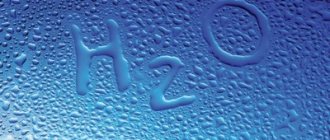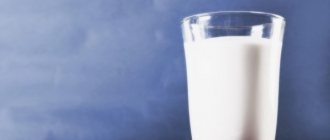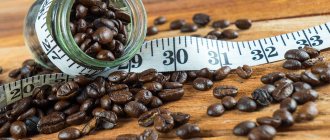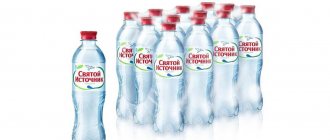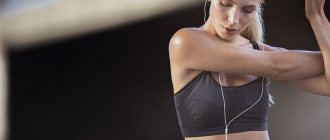Intense physical activity requires compliance with a whole set of rules that allow not only to improve the quality of the body, but also to maintain health even at a very high level of activity. But for neophytes, the question of whether it is possible to drink water during training quite often becomes a real stumbling block. Information on the topic remains quite contradictory. Meanwhile, during 60 minutes of training, the body loses fluid very intensively. And its volume can only be replenished artificially, by restoring the water balance in the body with the help of a carefully observed drinking regime.
How often and can you drink water during training to prevent dehydration? Depending on the athlete’s body weight and the degree of his training, moisture loss will be more or less intense. During exercise, muscles intensively generate heat, which in the absence of fluid coming from outside can lead to overheating. The recommendations of experienced athletes regarding whether you need to drink water during training in the gym are quite clear. It's a good idea to replenish your fluids several hours before starting your workout. And while playing sports, you need to drink at least 200 ml once every 20 minutes.
Is all water healthy?
When answering numerous questions about water balance in the human body, instructors often have to touch on the topic of why you shouldn’t drink water more often during training. Of course, you need to fully replenish fluid reserves, but you should not be overly zealous in this matter. And most importantly, you should choose correctly what will replace the mineral salts and other beneficial substances lost with sweat. The real leader in this matter remains non-carbonated drinks from artesian or mineral springs.
If exercise is carried out at a calm pace, and sweating is not too intense, the volume of fluid replenished in the tissues may be less. In this case, the body loses a minimum of moisture. But the question: why drink water during training remains open. Purely boiled or drunk, it allows you to increase endurance and makes it possible to avoid dehydration. Professional athletes who choose the most intense exercise regimen most often use isotonics. This type of sports drink contains sodium and a number of other essential ingredients.
What kind of water is best to drink?
The question of what kind of water you should drink during training cannot be answered in one word. It all depends on the purpose of the activity, the characteristics and physical capabilities of the body. Below are some tips that will help you decide what and in what situation is best to drink:
Drinking water
During a not too long workout, you can drink regular non-carbonated clean water. The most important point when drinking water is its quality. Tap water, in the form in which it enters our apartments, is completely unsuitable for consumption, as it contains a lot of harmful organic and inorganic impurities. Such water must be boiled and subsequently settled. Sometimes the issue of water purification can be solved with the help of high-quality filters.
An alternative would be to purchase water purified with special high-purity industrial filters. In any case, you should always have a bottle of high-quality water with you, since you must drink water during training.
Before or during?
Is it possible to drink water during training if you are not a professional athlete? During the period of active weight loss due to fat burning, the body can intensively lose minerals. In this case, you can choose drinks that are additionally enriched with amino acids and other beneficial ingredients. Drinks with l-carnitine allow you to saturate your cells with moisture and at the same time remove excess fat deposits from the body. And for those who are not afraid of extra calories, you can prepare drinks based on fruit juices in a ratio of 1 to 4 (50 ml per 200 ml).
How do you know if you can drink water before training? To avoid heatstroke in hot weather, be sure to drink at least 0.5 liters of liquid a couple of hours before starting classes. During other periods of the year, you can follow the usual drinking regime without changing it specially.
SportsQuestion to an expert: Is it possible to drink during training?
answers to most of the questions that concern us online. In a new series of materials, we ask exactly these questions: burning, unexpected or common ones - to professionals in a variety of fields.
Recently, the founder of the ballet studio, Alina Zvereva, talked about how she made the space comfortable for her students, including allowing them to freely drink water during classes. Many people have encountered bans on drinking during training – from physical education at school to personal lessons in the gym. Is it reasonable to avoid drinking water during physical activity? Is it true that “extra” fluid puts a strain on the heart or causes swelling? And if you can drink, how much and what is better to choose? We asked these questions to an expert.
Leonid Ostapenko
sports nutritionist, member of the International Sports Science Association (ISSA)
The basis of dietetics is not prohibitions and restrictions, but an adequate balanced diet, and it includes not only proteins, fats, carbohydrates, fiber, vitamins, but also, of course, water. When I ask almost all of my clients, it turns out that people are not getting enough fluids. At the same time, many, including athletes, do this consciously - themselves or on the instructions of a coach.
The human body consists of approximately 70% water. It mainly enters the body as part of solid foods and liquids, and the remaining small percentage is formed as a result of various metabolic processes. Water is excreted mainly through the kidneys, but it also evaporates from the surface of the skin, is released in the form of sweat and is released with exhaled air. These are large volumes: for example, through direct evaporation from the skin, a person loses about 300 ml of water per day, and exhales half a liter with air. The volume of sweat may vary depending on the load and climate, but it is at least 500 ml per day. Water is constantly used by the stomach and intestines to form digestive juices, the total amount of which reaches 8 liters per day. In general, restoring its reserves is vital: WHO recommends that women and men get 2.7 and 3.7 liters of fluid per day from food and drinks, respectively.
Abstinence from drinking is often explained by the fact that excess fluid increases the volume of circulating blood and supposedly overloads the heart - but this is a misconception. On the contrary, difficulties arise with insufficient hydration, when part of the water to cover the body's needs is extracted from the blood - and the latter becomes more viscous. The myocardium has to do much more work in trying to push blood into the smallest vessels. They often try to explain the lack of drinking as the prevention of swelling, but this is also incorrect. Water is not retained by itself - it is primarily bound by sodium (which we get from salt) and carbohydrates, especially sugar. Each gram of salt or sugar holds approximately 3.78 grams of water - that is, 100 grams of sugar will retain almost 400 milliliters. This water needs to go somewhere, and the most real contenders for places where it is stored are blood, the intracellular and intercellular environment - these are the reasons for increased blood pressure and edema.
Mineral salts are lost along with sweat, which leads to disturbances in the conduction of electrical impulses. In the long term, this can lead to heart problems.
And, of course, if a person plays sports not just for pleasure, but sets certain goals, be it increasing muscle mass, losing weight, or increasing speed and endurance, it will be more difficult to achieve these goals if there is not enough fluid in the body. Without normal hydration, the activity of biochemical processes in cells decreases, protein synthesis is inhibited, and strength and performance decrease. It’s even worse that during training, fluid is rapidly lost, because a person sweats. Along with sweat, mineral salts also leave, and this leads to disturbances in the conduction of electrical impulses - in the short term, this can lead to muscle spasms (for example, when a leg cramps painfully during sleep), and in the long term, to disturbances in the functioning of the heart.
To determine how much water you lose when playing sports, conduct an experiment: do not drink during training and weigh yourself before and after it without clothes. The difference in weight will be approximately the amount of water you should drink before and during physical activity. If you like accuracy, you can try to make such a calculation for different loads (for example, strength and cardio) - then it will become clear how much you exactly need to drink in each case. To avoid discomfort, especially if you are not used to drinking during exercise, take little and often, literally a couple of sips at a time - and start with a glass of water fifteen to twenty minutes before training.
Special sports drinks are also a good thing, they help restore mineral balance and contain a small amount of carbohydrates (glucose, fructose or ribose). They are called isotonic, but you need to understand that an isotonic is an aqueous solution of various substances with a concentration of no higher than 0.9%, that is, it is identical in density to blood plasma. More concentrated solutions are hypertonic, they are absorbed more slowly and are not suitable for drinking during training. Moreover, drinking such drinks can even accelerate dehydration: the body will release water into the intestines to dilute the contents to the concentration required for absorption.
Regular bottled water is typically a hypotonic solution, meaning it is low in minerals; it is absorbed very quickly, but under severe loads (for example, if you are running cross-country under the hot sun) it does not compensate for the loss of minerals. If the workouts are not very long or intense, water will do; if they are more difficult, you should switch to isotonic water. And, if you buy a powdered drink formulation, follow the directions on the label so you don't end up with a hypertonic solution instead of an isotonic one.
Photos: Shopee, karandaev – stock.adobe.com
Temperature
How do you know whether to drink warm water or pre-cool it during exercise? The recommendations of experts here are quite contradictory. For example, it is believed that chilled drinks better quench thirst and eliminate overheating of the body. But when deciding whether to drink water during training, it is necessary to take into account such points as the temperature and humidity of the environment, and blood pressure indicators. A sudden intake of liquid cooled almost to the freezing point can cause vasospasm. Moreover, you will have to spend much more time warming up the muscles and increasing results.
By choosing warm (room temperature) liquids to drink, you can replenish the hydrobalance disturbed by intense sweating and cope with intense tissue dehydration. Otherwise, the preferences of athletes can be individual and take into account their personal opinion when choosing a drink.
Reasons why you need to drink water
A lack of water in the body by at least 2% already significantly reduces your performance and training efficiency: strength indicators drop by 20%, and aerobic endurance by 50%. What is this connected with?
Dehydration causes changes in the quality of blood flow, as the blood becomes thick and its ability to carry oxygen to cells and tissues is significantly deteriorated. For this reason, fat cells do not oxidize and fat burning does not occur, since these two processes are closely interconnected and, unfortunately, cannot exist separately from each other. This leads to the first conclusion : drinking water during training is necessary for normal oxygen supply to all cells of the body, and in particular to fat cells, so as not to slow down the fat burning process.
- How to remove fat from thighs? A training program that gets rid of “butt ears”
The second reason, which follows from the first, is the increased load on the heart. Due to the fact that even with a slight degree of dehydration, the blood becomes thick, it becomes difficult for the heart to pass it through itself and further distribute it to all tissues and organs, and this in turn creates an excessive load on the heart during training.
We have already talked about the lack of water and the negative impact on weight loss, now it’s time to listen to the consequences of dehydration during training for those who like to build muscle mass. Drinking water during training helps protein to be better absorbed and amino acids to enter muscle tissue. If the body begins to receive less fluid, then these two processes worsen, and the process of building muscle mass slows down significantly. Therefore, drinking water during training is necessary not only for those who want to lose weight, but also for those who want to build muscle. Here water is a universal product for these seemingly two different purposes.
The next reason why you need to drink water during training is again related to the processes of fat burning and muscle building. In the process of burning fat or protein metabolism during the training process, end products of decomposition are formed in the blood, which, if they are not removed from the body, “slag” it, and this in turn prevents the body from delivering oxygen in the required quantities to cells and muscle tissue, which interferes with achieve your intended goals.
One of these breakdown products is lactic acid. Its accumulation in large quantities leads to muscle pain and decreased performance during exercise. To avoid this, consuming water during exercise is a must.
The importance of water in bodybuilding
For a bodybuilder, the importance of water is difficult to overestimate. When drying muscles before competitions or before the summer season, athletes actively manipulate the amount of water they consume so that their muscles become much more prominent!
Many people mistakenly believe that if you want to achieve high-quality, powerful relief on your body, then you need to limit the amount of fluid you consume. This is a superficial and unsubstantiated judgment. Now I will explain why.
The fact is that if the body does not have enough water, then it will try to retain it in as large quantities as possible, because. will think he is in danger. When you feel thirsty, your body has already lost about 1-2% of its weight! So you need to drink evenly throughout the day, not just during training.
When you lose about 3-4% of water from the body, you will not be able to run, if the water loss is about 5-6%, then you can forget about training in the gym, and if you lose more than 10%, then God willing, if you succeed save.
Otherwise, if you drink too much water, your body will eliminate all the excess water. He understands that there is no need to save water.
Thus, by manipulating the amount of water consumed, you can achieve extraordinary relief.
But still, it has an even more important function. It promotes the accumulation of glycogen in muscles.
Glycogen is the main storage carbohydrate in humans and animals. In other words, these are reserve energy batteries that the body spends primarily during training.
It is also interesting that glycogen, as a biochemical compound, consists of 75% water!
How to drink water correctly during the day
→ Train yourself to have a bottle of water at hand no matter where you are in the car, at work or training;
→ Drink water often, in small portions of 100-150g. every 20 minutes, except for drinking water 10 minutes before meals and within 30
minutes after finishing, this flushes out gastric juice, forcing the stomach to work harder;
→ Don't drink water ad nauseam, that's not good either, you should keep the dose within 34-50ml. water per day for every 1 kg. person's weight;
→ Avoid drinking ice water, drink at room temperature, but not lower than 15°C; in cold weather, even warm water is allowed;
→ Taking sports nutrition (protein, creatine, gainer, etc.) increases water consumption, so during this period you need to drink a lot of it.
→ Drink water within the required norm; if it is lower, it means metabolism decreases and calorie consumption decreases, more calcium and important essential minerals and trace elements are lost, so remember the 2 formulas below ;
→ If sport is not only a hobby, but practically a way of life and survival, to find out the limit of water drinking, use a simple formula, for example, your weight is 80 kg. – 80:2 = 40, then 40:10 = 4l. water per day. Exactly 4l. water per day norm and drinking limit.
→ The minimum water requirement is calculated differently - 80 kg: 30 = 2.7 l. So we calculated it for a person weighing 80 kg. you need to drink from 2.7 liters to 4 liters. Apply these formulas on yourself and the results will not be long in coming.
Water for training
♦ BEFORE STARTING YOUR TRAINING:
Don't ignore it and drink at least 500ml. water (2 cups) 2 hours before the start of training and another 250 ml. just before the start. If you exercise in cold or hot weather, increase your intake even higher than 600-700 ml. 2 hours and 300-400 before the start. If everything is clear with the heat, then ask, why in the cold? Then, at this time, the body intensively produces heat to warm the body, as a result, water is lost faster through sweat and breathing.
♦ IN TRAINING:
Train yourself to drink 200-300 ml every 15 minutes. water, this will slow down the process of dehydration, the less water in the body during training, the faster the metabolism occurs, and this is a plus both for losing weight and for increasing strength and muscle volume, this is especially important when performing basic heavy exercises - squats, deadlifts , bench press. Therefore, breaks to drink water are a must!
Understand that the less water, the more the knee and elbow joints rub and wear out; water helps keep them healthy.
At first it will be hard to get used to drinking water all the time, but over time you won’t feel it and everything will be all right
